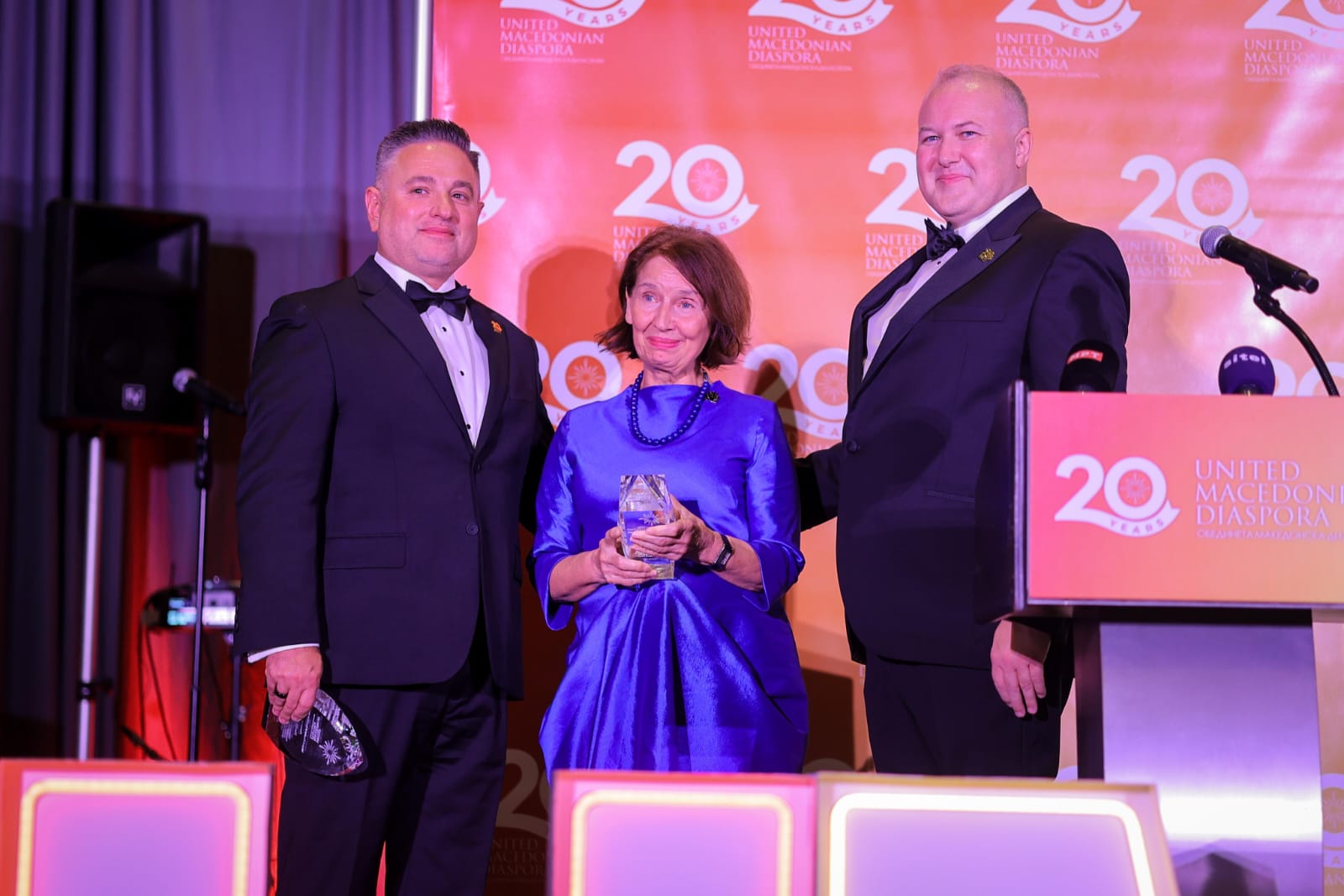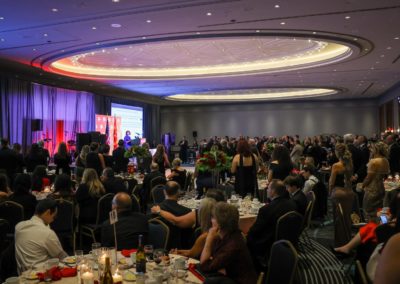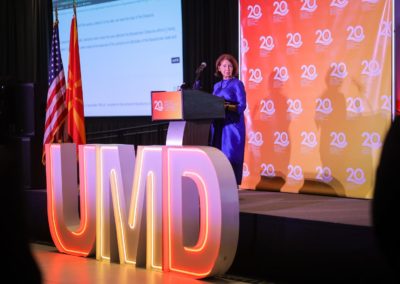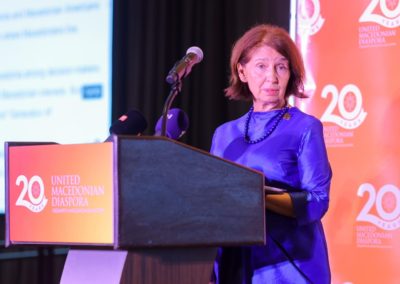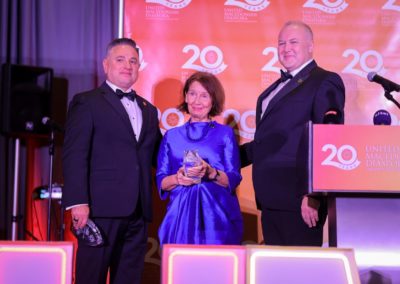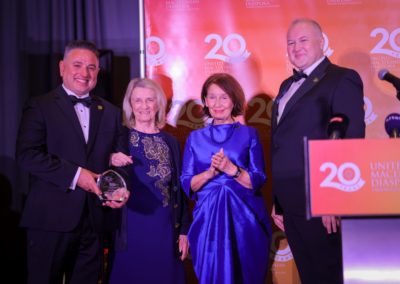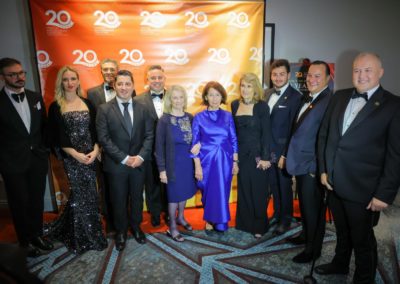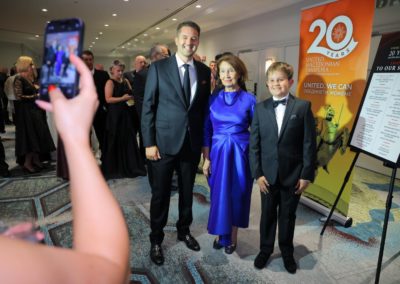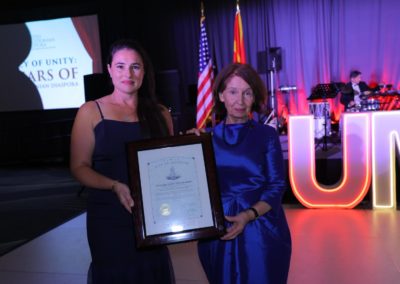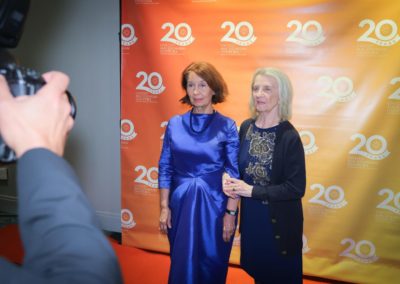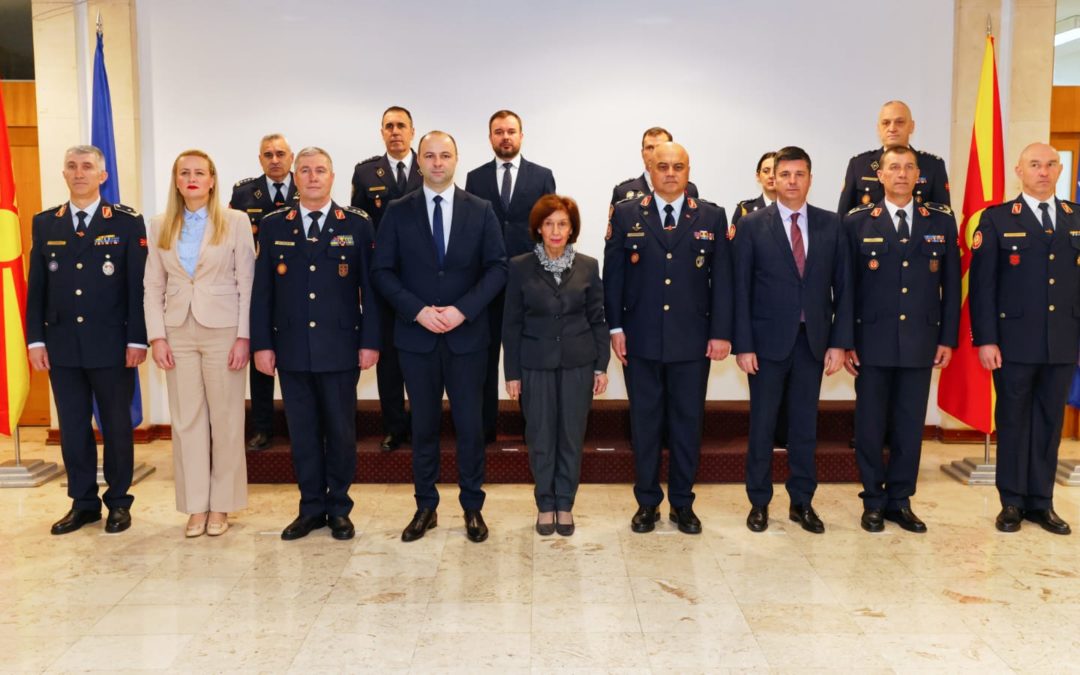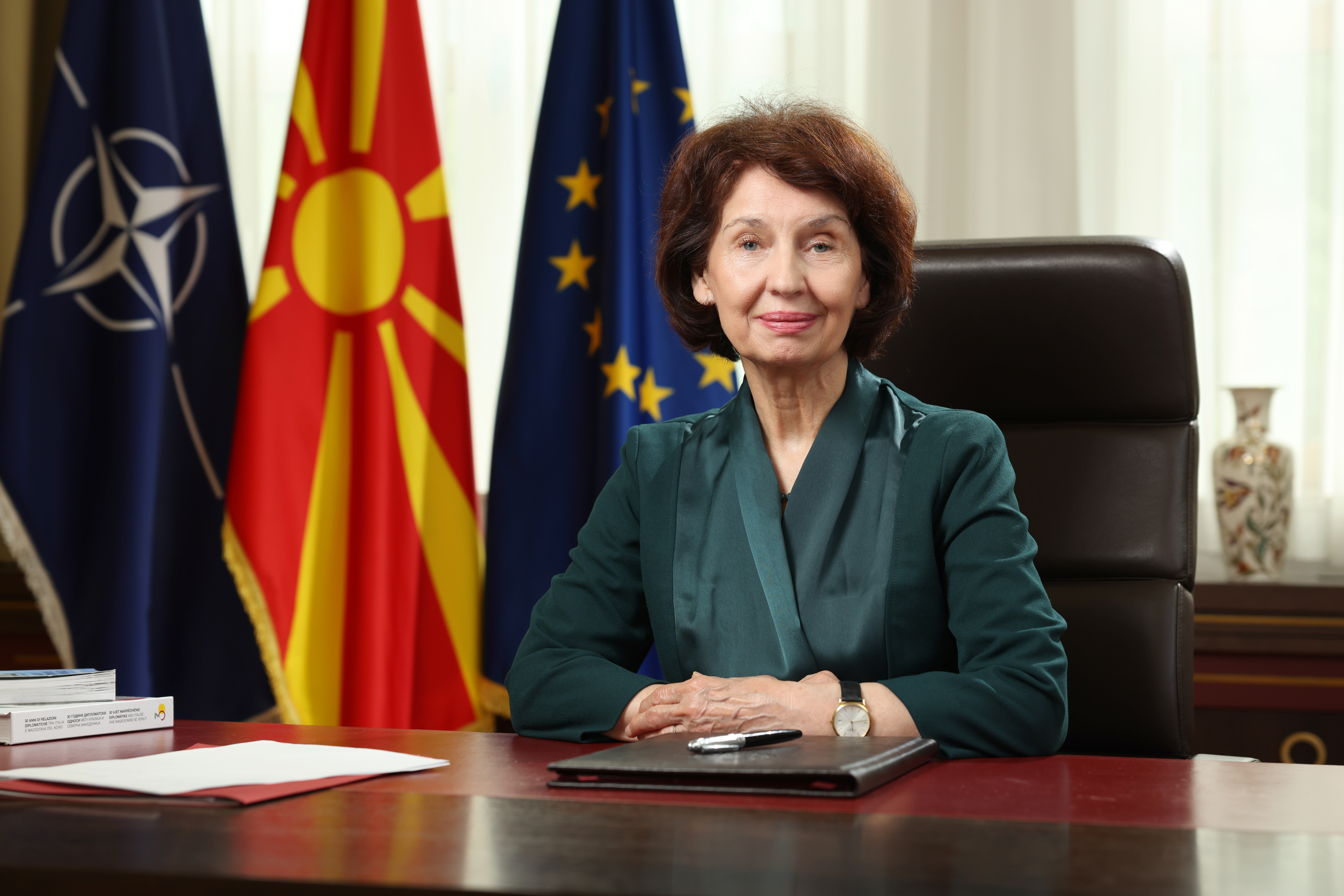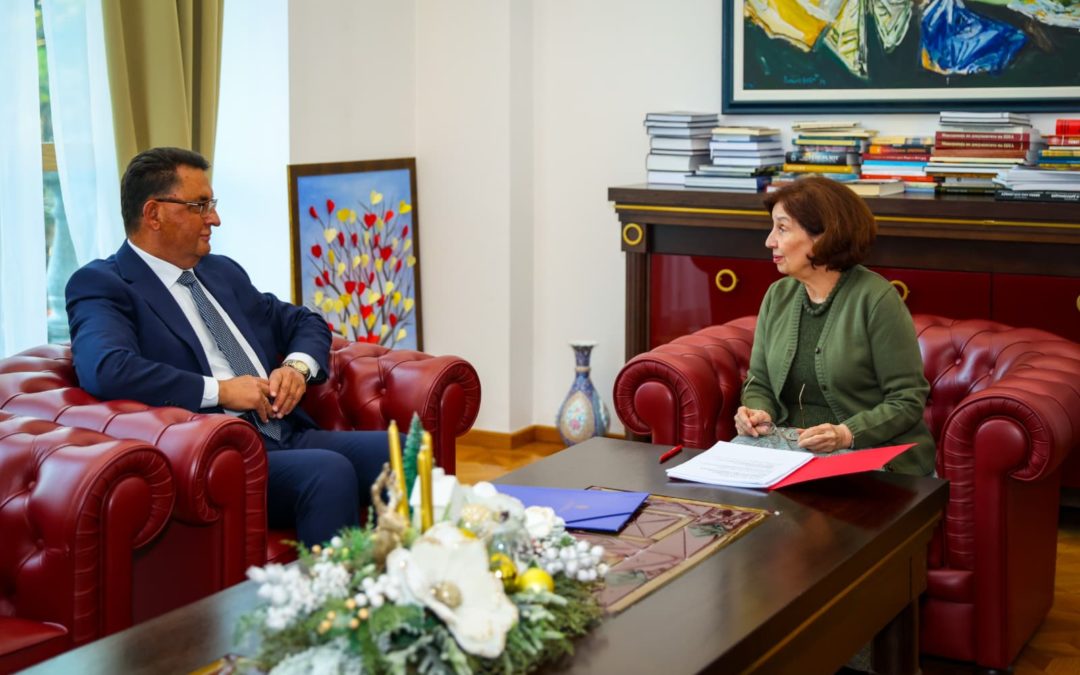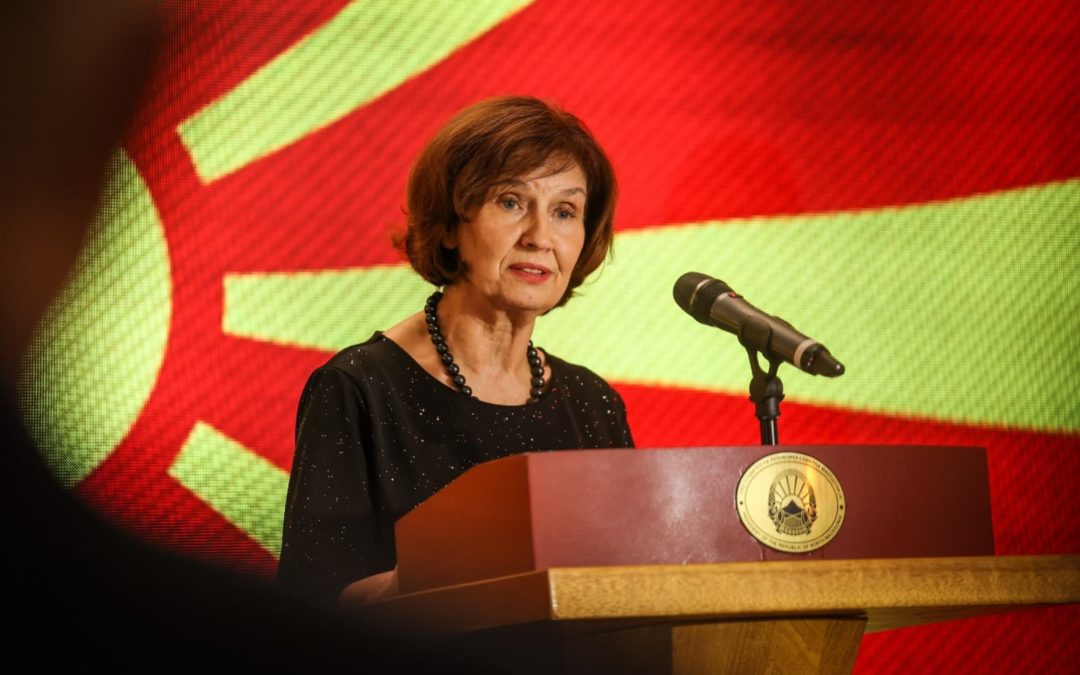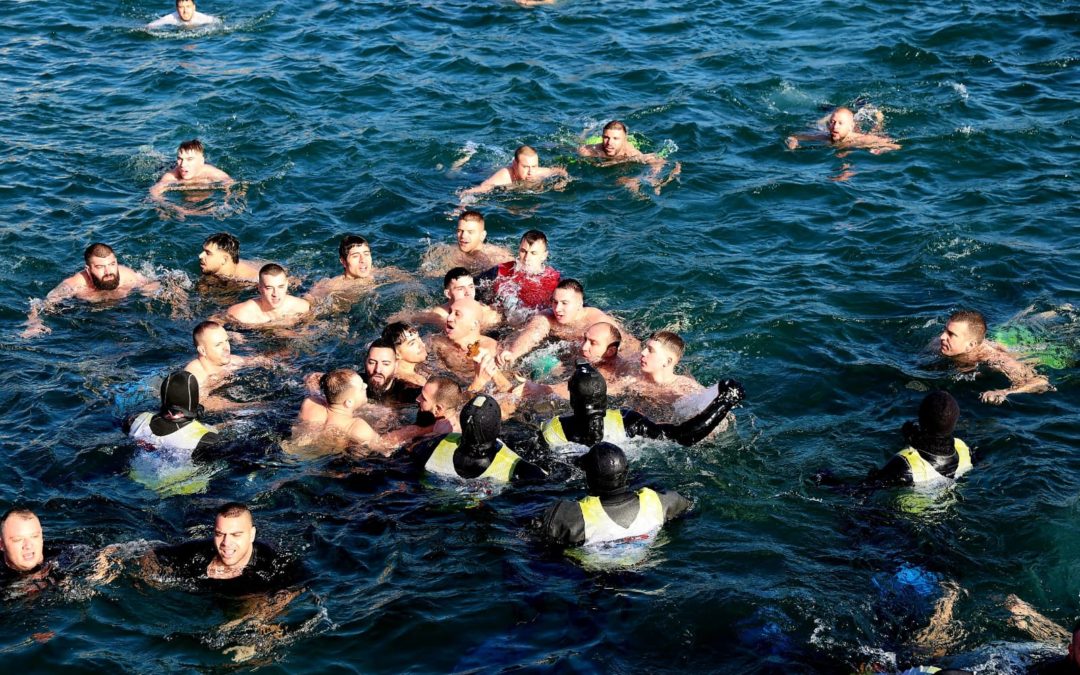President Gordana Siljanovska-Davkova addressed the gala evening marking the 20th anniversary of the United Macedonian Diaspora and the “40 Under 40” Awards held in Detroit, Michigan.
As part of the ceremony, which was held under the motto “Legacy of Unity: 20 Years of a United Macedonian Diaspora”, UMD awarded President Siljanovska-Davkova the “Global Statesman” Award.
Siljanovska-Davkova presented the “Daughter of Macedonia” Award to Marien Ilic, an award given by UMD.
Special recognitions were given to Jerry Naumoff – the “Macedonian Legacy in Public Service” award, as well as to the organization “World Medical Aid” – the “Friend of Macedonia” award.
Forty young members of the Macedonian diaspora around the world, successful and influential in their professions and communities, received the “40 under 40” award.Below is the full address of the President:
Dear Expatriates,
Let me thank our hosts, the United Macedonian Diaspora, for organizing this Gala Dinner. There is no better way to round off a visit to the United States than to meet with the Macedonian part of America.
This Gala is taking place at a very symbolic moment.
In September 1925, exactly 100 years ago, under pressure of the League of Nations, the ABECEDAR was printed in Athens, a school book for the Macedonian children. The primer, which was “printed in the Latin script and compiled in the Macedonian dialect”, never reached the children because almost all copies were destroyed. However, going through the pages of the few surviving copies, we can see that among the lessons intended for literacy in the native Macedonian language, on page 33 there is a sentence that refers to all of us gathered at this Gala Dinner, but also to the entire Macedonian Diaspora. That sentence reads: “My brothers are in a foreign land.” “My brothers are in a foreign land.”
Over the past hundred years, the foreign land seems to have become Macedonia’s fate. The reasons for emigration are varied.
Some of your ancestors left Macedonia fleeing persecution and the assimilation policies of the Balkan states at the beginning of the 20th century.
Others, left because of poverty.
Third, especially from the newer generations, are leaving because of the long democratic transition and consolidation and the unfinished battle for the rule of law.
However, these three groups that make up the Macedonian Diaspora have something in common. The ultimate motive of all emigrants, regardless of whether they are fleeing persecution, poverty or an uncertain future, is to exercise a fundamental human right, and that is the right to pursue happiness.
The pursuit of happiness, proclaimed in the American Declaration of Independence in 1776, is not a Hollywood cliché, but a vital need for a person to contribute meaningfully to the good of the community to which they themselves belong. The state exists to enable its citizens to attain happiness, to create value, and to advance on the basis of knowledge, quality, and abilities.
In that pursuit of happiness, some of you or your parents, grandparents, settled in the United States and Canada, others, throughout the more developed European countries, and third, in the southern hemisphere, in Australia and New Zealand.
Wherever you are, you, the expatriates, with much effort, dedication and sacrifice, create values and gain respect in your new environments. You are present in almost every segment of society – as successful entrepreneurs and managers, top scientists and doctors, renowned artists and award-winning athletes, renowned publicists and professors.
Some of you have built recognizable brands and become respected philanthropists. Looking at the examples of Mike and Marien Ilich, John Bitov, Mike Zafirovski, Jerry Naumoff, Mitre Kutanoski, Gjorgjija Atanasoski, Svetlana Mojsova, Ratka Damjanovikj, Metodija Koloski, Elizabeth Naumovski Chris Pavlovski, to name just a part of the Macedonian DIaspora constellation, one would say that successful emigrants have already reached happiness.
The Macedonian state and the Macedonian people are rightly proud of all of you.
Yet, we must ask ourselves a key question: Can there be true happiness without identity, without a sense of belonging? Can we be whole if a part of us has remained in the first homeland?
This is true not only for ethnic Macedonians, but also for every member of the Macedonian Diaspora who feels Macedonia as a first homeland. Have you ever wondered why many emigrants, regardless of ethnicity or religion, dream of returning and investing in their homeland? What is the force that draws us back to our roots?
Modern psychology claims that identity and belonging are inseparable from human well-being. Research shows that losing one’s mother tongue is not only a cultural loss, but can also be a personal trauma, undermining self-confidence and weakening self-identification. Language builds a strong sense of belonging. In one’s mother tongue, we most naturally express our essence.
The great Macedonian playwright, who himself became part of the Diaspora, Goran Stefanovski, reminded us that “in order to survive, people have a perfect innate instinct for weaving stories – about who they are, what they are, where they come from and where they are going. For us, there is nothing more important than these stories. They are the core of our lives, the pillar of our identity. Identity is a story about who we are, why we are and what we want. In order to survive in a harsh world, this story must be accurate, based on knowing the terrain, on deep insight, on a precise blueprint. The wrong story can cost us dearly…”
And the Macedonian story is woven from family stories, not only at home, but also in the Diaspora. Every life is a saga of successes and disappointments, but also for new breakthroughs, new horizons, new hopes. And, your story is also our story, and ours is also yours and will last as long as it is being told.
I believe that tonight there isn’t a single person from the diaspora among us who hasn’t been troubled by the question:
Will my children or grandchildren preserve the Macedonian identity?
Will they learn the Macedonian language?
Will they get to know the Macedonian tradition?
Will they be moved by the unique Macedonian musical 7/8 beat?
Will they self-identify as American, Canadian, European, Australian citizens, but with Macedonian origin, with Macedonian identity, or will they merge into the cultures in which they were born and raised?
Will my family story, being part of the common Macedonian story, end with my children or grandchildren?
Distinguished Attendees,
These are difficult, yet important questions.
I know that you have been doing and are doing a lot to preserve the Macedonian identity. With your help, Macedonian melody resonates through the most prestigious concert halls of the new world. Many Americans and Canadians gain their first impression of Macedonian culture precisely through you. That is the goal of successful programs such as “Birthright Macedonia” or the Macedonian language classes. You invest in Macedonian church boards, maintaining the bond with the Macedonian Orthodox Church – Ohrid Archbishopric. Indeed, with your presence tonight, you show your determination to preserve your part of the Macedonian story.
All these efforts lead to one conclusion: for the Diaspora, the pursuit for happiness does not end abroad but heads towards Macedonia. It is your native hearth, where your ancestors lived, is the true source of your identity. Your happiness largely depends on your homeland’s.
But, there is a problem here. Since independence, the success of the Macedonian state has been measured by whether it is a decent place to live and whether it offers equal opportunities for progress to all its citizens. This right is threatened by the corruption that has, over the past decades, violated the rule of law and undermined the common good. But also by the long-standing unjust blockades of our European integrations that have exhausted the state and still frustrate Macedonian citizens, violating their, your, our dignity.
Therefore, more and more of our young people believe that the pursuit of happiness is taking them outside our homeland. For some of them, the homeland is becoming just a temporary residence, a hotel, instead of a home to raise a family. The mass departure of young people has become the greatest threat to the future of Macedonia.
To prevent the exodus, before it is too late, we need the help of the Diaspora.
I am aware that in the past, decisions were made that also affected the Macedonian Diaspora without it being consulted. Compromises were made at the expense of the symbols and attributes of the Macedonian state and Macedonian identity. This is especially difficult, considering that emigrant Macedonia is more numerous than domicile Macedonia. To neglect the Macedonian Diaspora is to ignore more than half of the nation.
Such a relationship led to alienation between the homeland and the diaspora, to the detriment of state and national interests. But, there have always been people of goodwill, great patience and understanding on both sides who maintained the connection between the homeland and the diaspora.
For example, the Ilic family helped to form the Congressional Caucus for Macedonia and Macedonian Americans in 2011. Similar parliamentary groups have been formed in many countries where Macedonians live.
United Macedonian Diaspora has built a network of friends and supporters of Macedonia among decision-makers. With your help, many declarations and resolutions were passed in defense of the Macedonian interests. But it also supports young people through programs such as “40 under 40” and “Generation M”.
Or, the ‘Macedonia 2025’ team strengthens ties between successful expatriates and the homeland through investment forums, summits, and involvement in development strategies.”
I will also highlight philanthropists who support the homeland by investing in schools, hospitals, and other institutions, providing scholarships, and connecting the most successful into an influential community.
The Diaspora is a part of Macedonia as Macedonia is a part of the Diaspora.
My commitment to the Diaspora goes beyond election rhetoric. Our government is preparing a five-year National Diaspora Strategy, with my Cabinet actively participating through its representatives. This strategy should enable the Diaspora to be much more actively involved in public debate and in strengthening the state.
Additionally, as I promised in my election program, I plan to establish a Council for the Diaspora within the Cabinet of the President.
For me, you, members of the Diaspora, are voluntary ambassadors of our country, who live beyond its borders and represent our values. You are our kin, even though you live abroad. Therefore, the state will continue to make efforts to strengthen your ties with Macedonia. Diaspora policies must be non-partisan and prioritized, regardless of who is in power.
We need your investments, but also your ideas, your knowledge and experience. We need your lobbying in the centers of power and influence, but also your active participation in creating policies and making decisions here, at home. That participation must include understanding for the everyday challenges of Macedonian citizens who are also pursuing happiness, but in their homeland, not abroad.
The Diaspora must be an equal partner in making Macedonia a decent place to live where young people stay and expatriates fulfill their pursuit of happiness.
There is a lot of work for us. Countries with strong Diasporas prosper. Countries with weak Diaspora stagnate. It is not just about financial resources or lobbying, but about something much deeper. It is about transferring values, sharing knowledge and skills, raising expectations for living standards, cultivating more sustainable habits. Just as the homeland should preserve the past of the Diaspora, the Diaspora is the guardian of the future of the homeland.
Dear friends,
I will conclude with the following.
On September 2, 1945, 80 years ago, right here in Detroit, the great Macedonian-American writer Stojan Hristov, addressing the Assembly of the Macedonian-American People’s Union, said: “For a week or two after August 2, 1944, every morning after waking up I had to stand up and tell myself that there was now a free Macedonian state. It seemed like a miracle to me, so I had to force myself to believe it is true. It was too good to be true. It was like being poor all your life, and then suddenly you got a million dollars. It simply seemed unreal. But soon the new Macedonian state became second nature to me. And now it seems to me as if there had always been a Macedonian state.”My dear compatriots,
Stojan Hristov achieved happiness because for him the first homeland became second nature. The homeland is yours, as much as it is ours. It is one and common, the only common homeland.
Thank you.
